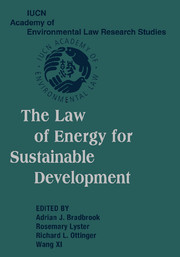Book contents
- Frontmatter
- Contents
- Acknowledgments
- Message from Kofi A. Annan, Secretary-General, United Nations
- Introduction – A Global Learned Society to Address Earth's Evolution: The IUCN Academy of Environmental Law
- Public Lectures on International Environmental Law
- PART ONE SUSTAINABLE DEVELOPMENT AND THE ROLE OF ENERGY LAW
- PART TWO LEGAL ISSUES IN CONTEMPORARY ENERGY LAW
- PART THREE INTERNATIONAL ENERGY LAW
- PART FOUR COMPARATIVE ENERGY LAW
- 18 UNDP: China's Energy Portfolio
- 19 Implementing the Kyoto Protocol beyond the WSSD at Johannesburg – The Japanese Perspective
- 20 Strategy, Policy, and Law Promoting Renewable Energy Resources in China
- 21 Energy Development and Utilization in Africa
- 22 European Energy Law Initiatives
- 23 The Law of Energy for Sustainable Development in Britain
- PART FIVE ELECTRICITY RESTRUCTURING
- PART SIX FINANCING FOR SUSTAINABLE ENERGY
- PART SEVEN CIVIL SOCIETY AND THE PROCEDURAL REQUIREMENTS OF ENERGY LAW FOR SUSTAINABLE DEVELOPMENT
- Index
23 - The Law of Energy for Sustainable Development in Britain
Published online by Cambridge University Press: 10 August 2009
- Frontmatter
- Contents
- Acknowledgments
- Message from Kofi A. Annan, Secretary-General, United Nations
- Introduction – A Global Learned Society to Address Earth's Evolution: The IUCN Academy of Environmental Law
- Public Lectures on International Environmental Law
- PART ONE SUSTAINABLE DEVELOPMENT AND THE ROLE OF ENERGY LAW
- PART TWO LEGAL ISSUES IN CONTEMPORARY ENERGY LAW
- PART THREE INTERNATIONAL ENERGY LAW
- PART FOUR COMPARATIVE ENERGY LAW
- 18 UNDP: China's Energy Portfolio
- 19 Implementing the Kyoto Protocol beyond the WSSD at Johannesburg – The Japanese Perspective
- 20 Strategy, Policy, and Law Promoting Renewable Energy Resources in China
- 21 Energy Development and Utilization in Africa
- 22 European Energy Law Initiatives
- 23 The Law of Energy for Sustainable Development in Britain
- PART FIVE ELECTRICITY RESTRUCTURING
- PART SIX FINANCING FOR SUSTAINABLE ENERGY
- PART SEVEN CIVIL SOCIETY AND THE PROCEDURAL REQUIREMENTS OF ENERGY LAW FOR SUSTAINABLE DEVELOPMENT
- Index
Summary
The concept of a “balance of powers” is unknown in the British Constitution. The executive arm of government is entirely selected by the Prime Minister of the day from among those elected to the legislature. And the Prime Minister is in turn only elected by the members of the legislature. Thus, both Parliament and ministers are run via the same electoral mandate and, owing to the peculiar electoral system operating in the UK, will invariably be of the same, single party.
So, most legislation is conceived, prepared, and processed by the government of the day. As the influential House of Commons Environmental Audit Committee has somewhat acidly observed, energy efficiency is the exception to the rule. Practically every significant Act of Parliament over the past decade affecting the demand side of energy has emanated from initiatives undertaken by backbench Members of Parliament (MPs) – interestingly drawn from all three major parties.
In contrast, the one significant government sponsored measure – the Utilities Act 2000 – simply formalized a system of funding for household energy measures long required by the independent energy regulators.
The sole exception to this rule has been the use by the Chancellor of the Exchequer (finance minister) of his annual Finance Act to introduce fiscal measures designed to encourage energy saving investment (or not, as the case may be).
The classic taxation issue has long been that of the levels of Value Added Tax (VAT) imposed on energy conservation, as opposed to energy consumption.
- Type
- Chapter
- Information
- The Law of Energy for Sustainable Development , pp. 395 - 404Publisher: Cambridge University PressPrint publication year: 2005

